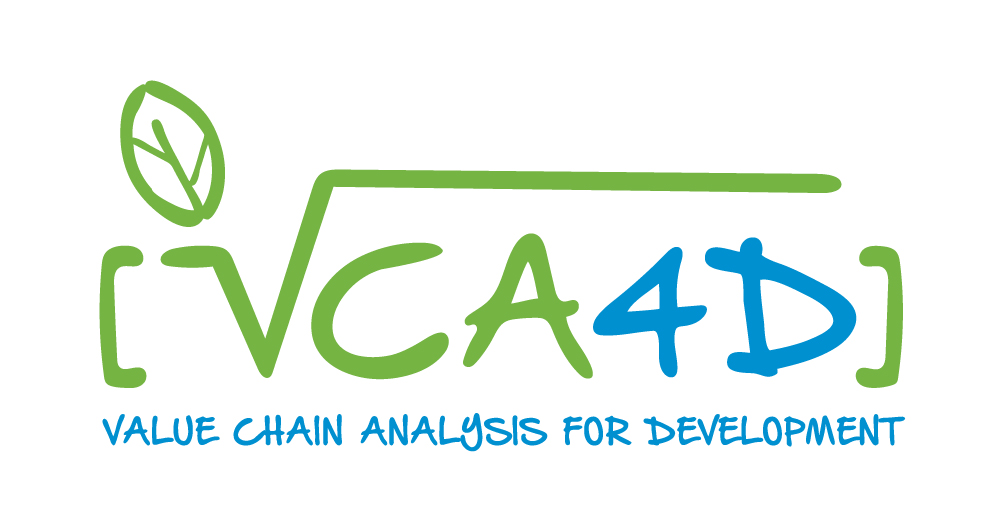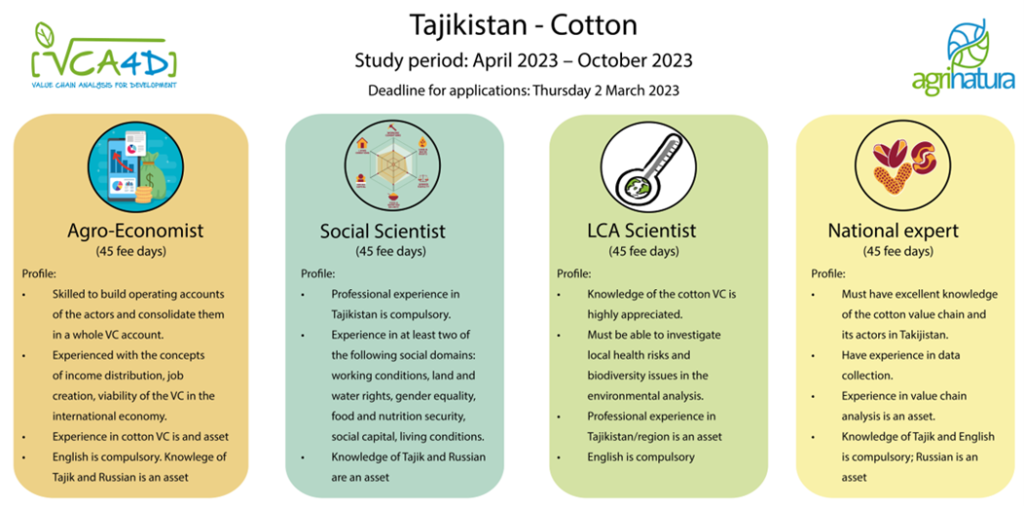
The VCA4D project launches a new call for experts for a value chain analysis on cotton in Tajikistan.
The profiles are detailed below. Each expert will have 45 working days (50 for the team leader). The period for the study is April– October 2023.
The ToR will be circulated as soon as approved – but this is expected to be a standard study, undertaken by using the VCA4D methodology, as described in the ‘Methodological Brief. Tools and Methods’. WEBSITES
Please send the CVs of candidates to vca4d@agrinatura-eu.eu and giorgia.mei@agrinatura-eu.eu , by Thursday, 2nd March 2023.

Context
Tajikistan is a small, open, landlocked economy dominated by the production of aluminium, cotton and electricity. Cotton makes a significant contribution to both the agricultural sector and the national economy of Tajikistan, being an important source of export earnings and tax revenue.
Cotton production in 2022 reached more than 400.000 tons, with more than 100.000 tons of cotton fiber produced. Around 100 cotton ginning factories and 10 spinning companies operate in Tajikistan, with a production capacity above the 80.000 tons of cotton yarn. Nevertheless, only 20 percent of the cotton Tajikistan produces is processed into manufactured goods in the country, while the remainder is exported as cotton fiber for manufacturing mostly to Turkey, China, Russia, Kazakhstan.
While Uzbekistan is by far the lead producer in the region, Tajikistan is the first country in Central Asia to work with the Better Cotton Initiative which has the objective to engage clothing and textile companies around the world to use 100 percent sustainable cotton by 2025. Currently, the textile industry is considered a priority sector by the government for its export and textile potential.
The EU is preparing a new action in support of the agribusiness sector and the promotion of the cotton industry is identified as a priority. The EU Delegation to Tajikistan mobilized the VCA4D project for an analysis of the cotton value chain to have a comprehensive overview of this strategic sector. The analysis will pay attention in particular to the bottlenecks to transformation, including to national processing, as well as to the valorisation of cotton derived products and more eco-compatible practices of cotton production and ginning.
1) Economist
S/he is a senior expert with deep knowledge and experience on agricultural value chain analysis from an economic point of view. S/he will elaborate financial and economic accounts of the VC (and its sub-systems) as a whole and of its actors. He/she will analyse the VC from the different actors’ perspectives, as well as its contribution to the main economic indicators (GDP, balance of trade, public finance, etc.). He/she will be at ease with the concepts of income distribution, job creation, growth and distributive effects, viability of the VC in the international economy, etc. S/he will undertake a full functional analysis with the support of his/her colleagues.
Experience on economic analysis in value chain at the micro and macro levels is required and knowledge of the cotton value chain is highly appreciated.
Experience in transition countries is required.
Professional experience in Tajikistan and in cotton is an asset.
Knowledge of English is required and knowledge of Russian and Tajik is an asset.
Experience in stakeholders’ management (including relations with high level officials and private sector) and analysis of public policies are a plus.
The economist will coordinate and consolidate the functional analysis, compiling the contributions from all experts. S/he will provide a Functional and Economic Analysis that will be included in the final report.
A collective training or at least an individual introduction to the AFA software will be made prior to the first mission. In the case the training cannot be done before the first mission, it will be done before the second mission.
S/he will help the team leader (if another member of the team) to (i) define the typology of actors that will be adopted throughout the study; (ii) formulate an executive summary and conclusions that combine the results of the different analyses in order to answer the framing questions and to finalise the report (reading, formatting of the report…). If relevant, the expert will collaborate and integrate the analysis on market trends provided by COLEAD.
2) Social expert
S/he is a senior expert with deep knowledge of and experience on social issues related to agricultural value chains in developing countries, particularly on inclusiveness of the most vulnerable groups.
The expert has experience at least in two of the social domains covered by VCA4D (working conditions, land and water rights, gender equality, food and nutrition security, social capital, living conditions) and is able to handle and inform on the other ones.
Experience in social analysis of the agricultural sector is required, and specific experience on social issues in developing countries is strongly appreciated.
Experience in social aspects of the cotton VC is highly appreciated.
Professional experience in Tajikistan or in neighbouring countries is required.
Knowledge of English is required and knowledge of Russian and/or Tajik is an asset.
Experience in stakeholders’ management (including relations with high level officials and private sector) and analysis of public policies are a plus.
The social expert will provide a social analysis to be included in the report, on the basis of the VCA4D Social Profile. An introduction on how to complete the Social Profile will be made prior to the first mission.
The Social Expert will also support the economist for the analysis on inclusiveness and the LCA expert to deal with the Biodiversity Analysis.
S/he will help the team leader to: (i) define the typology of actors that will be adopted throughout the study; (ii) formulate an executive summary and conclusions that combine the results of the different analyses in order to answer the framing questions and to finalise the report (reading, formatting of the report…).
3) Environmental/LCA expert
S/he is a senior expert with deep knowledge of and experience on the Life Cycle Analysis (LCA).
Experience on value chain analysis in developing/transition countries is appreciated.
Experience in cotton VCs is an asset.
Professional experience in Tajikistan is an asset.
Knowledge of English is required and knowledge of Russian and/or Tajik is an asset.
S/he will preferably use the SimaPro software for LCA.
The LCA Scientist must be able to investigate also local health risks and biodiversity issues in the environmental analysis.
S/he will provide the part of the report on the Environmental Analysis that will be included in the final report. His/her analysis will focus on the analysis of damages on resources, ecosystems and human health, as well as on the impacts on climate change. The expert will also integrate and complement (with the support of the social expert) an analysis of biodiversity, part of which will be provided by the JRC.
S/he will help the team leader to: (i) define the typology of actors that will be adopted throughout the study, (ii) formulate an executive summary and conclusions that combine the results of the different analyses in order to answer the framing questions and to finalise the report (reading, formatting of the report…).
4) National Expert
S/he is a specialist of the cotton value chain in Tajikistan.
Knowledge of English is compulsory and the knowledge of Russian and Tajik or at least of the two languages locally used is necessary.
Relevant knowledge of the national institutions (technical, economic and political ones) and stakeholders (public and private) involved in the cotton value chain is required.
At the beginning of the study, s/he will provide general information on the value chain, identifying key players and existing relevant information and data for the analyses. The national expert will help to select the most relevant data from available sources, to clarify inconsistencies and to improve coherence between analyses.
S/he will facilitate and complete the data collection, in agreement to the guidelines of the Team Leader. S/he will facilitate the contact between the whole team and the local stakeholders.
Depending on the organization chosen by the team, his/her work can be deployed before the missions (preparation of the mission of the colleagues), during the missions (support of colleagues during missions), between missions (collection of additional information, supervision of data collection, etc.), even after missions (additional information).
by secretary
by secretary
by secretary
by secretary
by secretary
by secretary
by secretary
by secretary
by secretary
by secretary
by secretary
by secretary
by secretary
by secretary
by secretary
by secretary
by secretary
by secretary
by secretary
by secretary
by secretary
by secretary
by secretary
by secretary
by secretary
by secretary
by secretary
by secretary
by secretary
by secretary
by secretary
by secretary
by secretary
by secretary
by secretary
by secretary
by secretary
by secretary
by secretary
by secretary
by secretary
by secretary
by secretary
by secretary
by secretary
by secretary
by secretary
by secretary
by secretary
by secretary
by secretary
by secretary
by secretary
by secretary
by secretary
by secretary
by secretary
by secretary
by secretary
by secretary
by secretary
by secretary
by secretary
by secretary
by secretary
by secretary
by secretary
by secretary
by secretary
by secretary
by secretary
by secretary
by secretary
by secretary
by secretary
by secretary
by secretary
by secretary
by secretary
by secretary
by secretary
by secretary
by secretary
by secretary
by secretary
by secretary
by secretary
by secretary
by secretary
by secretary
by secretary
by secretary
by secretary
by secretary
by secretary
by secretary
by secretary
by secretary
by secretary
by secretary
by secretary
by secretary
by secretary
by secretary
by secretary
by secretary
by secretary
by secretary
by secretary
by secretary
by secretary
by secretary
by secretary
by secretary
by secretary
by secretary
by secretary
by secretary
by secretary
by secretary
by secretary
by secretary
by secretary
by secretary
by secretary
by secretary
by secretary
by secretary
by secretary
by secretary
by secretary
by secretary
by secretary
by secretary
by secretary
by secretary
by secretary
by secretary
by secretary
by secretary
by secretary
by secretary
by secretary
by secretary
by secretary
by secretary
by secretary
by secretary
by secretary
by secretary
by secretary
by secretary
by secretary
by secretary
by secretary
by secretary
by secretary
by secretary
by secretary
by secretary
by secretary
by secretary
by secretary
by secretary
by secretary
by secretary
by secretary
by secretary
by secretary
by secretary
by secretary
by secretary
by secretary
by secretary
by secretary
by secretary
by secretary
by secretary
by secretary
by secretary
by secretary
by secretary
by secretary
by secretary
by secretary
by secretary
by secretary
by secretary
by secretary
by secretary
by secretary
by secretary
by secretary
by secretary
by secretary
by secretary
by secretary
by secretary
by secretary
by secretary
by secretary
by secretary
by secretary
by secretary
by secretary
by secretary
by secretary
by secretary
by secretary
by secretary
by secretary
by secretary
by secretary
by secretary
by secretary
by secretary
by secretary
by secretary
by secretary
by secretary
by secretary
by secretary
by secretary
by secretary
by secretary
by secretary
by secretary
by secretary
by secretary
by secretary
by secretary
by secretary
by secretary
by secretary
by secretary
by secretary
by secretary
by secretary
by secretary
by secretary
by secretary
by secretary
by secretary
by secretary
by secretary
by secretary
by secretary
by secretary
by secretary
by secretary
by secretary
by secretary
by secretary
by secretary
by secretary
by secretary
by secretary
by secretary
by secretary
by secretary
by secretary
by secretary
by secretary
by secretary
by secretary
by secretary
by secretary
by secretary
by secretary
by secretary
by secretary
by secretary
by secretary
by secretary
by secretary
by secretary
by secretary
by secretary
by secretary
by secretary
by secretary
by secretary
by secretary
by secretary
by manager
by manager
by manager
by manager
by manager
by manager
by manager
by manager
by manager
by manager
by manager
by manager
by manager
by manager
by manager
by manager
by manager
by manager
by manager
by manager
by manager
by manager
by manager
by manager
by manager
by manager
by manager
by manager
by manager
by manager
